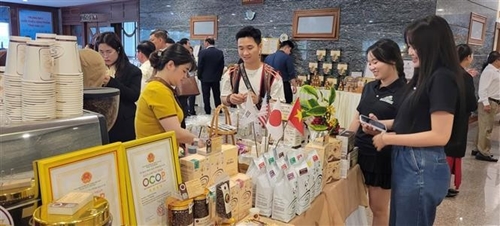This was a significant move to establish Gia Lai as a stable and official supplier of farm produce to this large consumer market.
    |
 |
|
Delegates learn about key agricultural products of Gia Lai province. |
According to the provincial Department of Agriculture and Environment, the province is home to 977,000 hectares of agricultural land, with more than 753,000 hectares of fertile basalt and yellow soil well-suited for industrial crops, fruits, and medicinal plants. The province’s flagship products include coffee, banana, passion fruit, and durian, many of which are certified under national and international standards such as Organic, GlobalGAP, VietGAP, and Rainforest Alliance.
Gia Lai has expanded tropical fruit cultivation, including watermelon, dragon fruit and avocado, alongside high-value medicinal crops like red reishi mushroom, turmeric, ginger, and lemongrass. To meet quality standards and traceability requirements, the province has granted 248 planting area codes and established 40 packaging facilities with combined daily capacity of 1,800 tons, creating a solid foundation for official exports to China.
Vice Chairman of the provincial People’s Committee Nguyen Tuan Khanh affirmed that China is one of Vietnam’s largest trading partner, with two-way trade turnover of some 171 billion USD last year. For Gia Lai specifically, China represents a crucial market for agricultural and forestry exports, though one that demands strict quality controls and origin verification.
Chinese market demand is diverse, favoring products where Gia Lai holds competitive advantages including coffee, durian, passion fruit, black pepper, and coconut, he said, adding the province will work to standardize its cultivation area, promote intensive processing, and implement a “single-point contact” mechanism to support businesses before, during, and after transaction.
Zhu Houyan, a representative from the Big Data Development Bureau of China’s Guangxi Zhuang Autonomous Region, expressed his readiness to facilitate cooperation between Guangxi firms and Gia Lai producers. He emphasized the significance of transparent data on production volumes, harvest schedules, packaging, labeling, preservation, and electronic shipping documentation to shortening customs clearance, cutting logistics costs, and ensuring stable supply.
He also highlighted opportunities for collaboration in AI-powered agriculture, from research and development and training to trade expansion.
Deputy Director of the Agency for Innovation, Green Transition and Industry Promotion under the Ministry of Industry and Trade Do Thi Minh Tram said as China is a major market with stable demand for agro-fishery-timber products, the ministry will carry out measures to improve product quality and help localities to effectively and sustainably capitalize on this market.
In the framework of the conference, enterprises of both sides exchanged Memoranda of Understanding, opening up substantive collaboration potential in the coming time.
Source: VNA